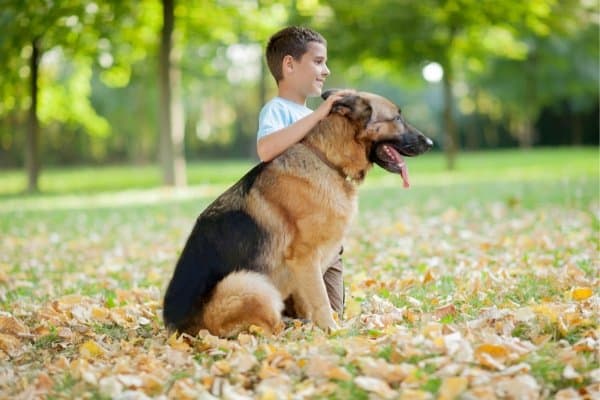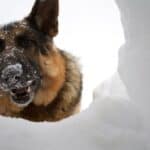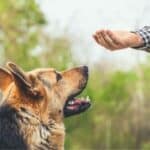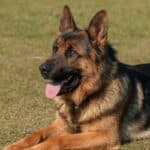Have you ever wondered if German Shepherds are prone to jealousy? Are they more likely to be jealous than other breeds of dogs? Here is everything that you need to know about jealousy in German Shepherds and what to do about it.
Do German Shepherds get jealous? German Shepherds do get jealous. While they may not be as likely to feel this way as some breeds, they are more likely to show jealousy than many other dogs. German Shepherds bond closely with their person and are intelligent, making jealousy a real possibility.
Learn what you need to know about your German Shepherd’s possible jealousy, signs that jealousy is occurring, and ways that you can deal with it.
Signs That Your German Shepherd is Jealous
The German Shepherd is a highly intelligent breed that bonds closely with their person, so it shouldn’t be any surprise that they can sometimes be prone to jealousy. Keep in mind that your German Shepherd may be jealous of other people, dogs, cats, and other animals in your life.
Some dogs may even be made jealous if you show affection to a toy or are too engrossed in an activity. Here are some indications that your German Shepherd may be experiencing jealousy.
Body Blocking
One of the most common indications of jealousy in your German Shepherd is if they stop someone from getting to you by putting their body between you. If you find your Shepherd getting in the way when your partner tries to give you a kiss or when you call another dog over to be pet, there’s a good chance you’re seeing jealousy.
Limiting a Person or Animal’s Movements
Sometimes, a jealous dog will not only keep people or animals from getting to their favorite person, but they may restrict their movements overall. If you find that your German Shepherd is keeping your other dogs or cats in a specific part of the house or trying to push your kids out of a room, it could be jealousy that is at fault.
Keep in mind that German Shepherds are a herding breed, and so sometimes this kind of behavior is just instinctual, while other times it is indicative of jealousy. Look for other signs of jealousy to see if that’s what’s going on with your dog.
Showering You With Affection and Crowding Your Space
If your German Shepherd showers you with attention and tries to climb onto your lap every time someone else enters the room, it is very likely that either jealousy or fear is at play. Some dogs respond to a fearful situation by seeking out comfort, but the anxiety of jealousy can also result in similar feelings.
Acting Hurt When Told to Back Off
If when you tell your German Shepherd that you need a little room or that you want to pay attention to your child/partner/another dog, your Shepherd throws a little hissy fit or leaves the room, you can assume that they can’t stand watching you interact with other animals and are complaining or taking themselves out of the situation so that they don’t react inappropriately.
Aggression
It can be hard to tell the difference between a dog who is feeling jealous and one who is being possessive. Jealousy generally refers to the dog’s reaction to other people and animals, while possessiveness speaks to the way the dog looks at you all the time.
If your dog growls or nips only at other people when they approach you, you can expect jealousy. If your dog also growls or nips at you when you try to move them away from you, possessiveness is more likely at fault.
Urinating or Defecating Inside
We aren’t sure why, but some dogs urinate or defecate inside when they are trying to keep somebody or something out of their space. They may also urinate or defecate on things that they associate with you in order to claim you and your associated items as their own.
Common Reasons for Jealousy
All kinds of dogs experience jealousy, but sensitive dogs who tend to bond closely with their owners, like German Shepherds, may be particularly prone to this less-than-flattering emotion. Dogs generally feel jealousy when they believe that their special relationship and place with their favorite human is being threatened.
The threat can come from your significant other, family members, your children, other pets, or even a hobby or toy that is particularly engaging for you. Anything that takes your attention away from your dog can be a source of jealousy.
How To Stop Your Dog From Being Jealous
Stopping your dog from being jealous can be challenging, and you may never be able to completely eliminate your German Shepherd’s feelings of jealousy. That said, you can do things to stop them from acting out as a result of their jealousy.
The single most important thing that you need to do in order to stop your dog from acting out their jealousy is to physically separate yourself from them. Your German Shepherd is probably standing very close to you if not on top of you while acting out their jealousy.
Teach your dog to go to their place or crate them. It is essential that you not only separate yourself from your dog when other people or animals are near, as this may only increase your dog’s assumption that these people and animals keep you away from them. Instead, control your dog’s access to you at all times.
Only allow your dog to come and sit near or on you when you call them and be careful to call them at all kinds of different times including when there are other animals and people around and when they are not. Otherwise, your dog needs to stay in their place, which may be within sight of you but is not touching you or so close that they can act out defensively.
If your dog is displaying jealousy towards another person, it can also help for that person to spend extra time bonding with your dog.
Do Dogs Really Feel Jealous?
Experts used to believe that the jealousy that pet owners believe they saw in their pets was actually a display of social hierarchy. But the understanding of canine social structure has progressed and studies show that domestic dogs display similar signs of jealousy when their owners interact with another dog as human infants do when their parents interact with another infant.
So the conclusion can be made that dogs do in fact feel and act on jealousy.
Are German Shepherds protective of their person?
The line between protectiveness and jealousy is very thin. In order to understand the difference, it is important to consider motivation. Dogs who are acting out of jealousy try to keep people and other animals away from you for their benefit, while dogs who are being protective may try to keep people and other dogs away from you because they really think they may hurt you.
German Shepherds have been bred and trained to be protectors throughout their entire history, so this breed is more prone than others to be protective even when no protection is needed. The tactics for teaching your dog not to be protective are similar to those needed to teach them not to be jealous, so you have a similar plan of action regardless of what your dog is feeling.
Do German Shepherds bond with only one person?
German Shepherds are known to be excellent family dogs who do well with all members of the family. They are usually tolerant of children and do well with other pets provided they are raised around them or slowly introduced.
Shepherds are not as well-known for bonding with only one person as some breeds, like the Akita or Chihuahua, but they are known to be the type of dog who can form very strong attachments to only a few people.
It is likely that your dog will bond to everyone in your family, but if one person provides most of the care and engagement, your German Shepherd may only bond deeply with them.
Dogs who are being trained for service work such as seeing-eye dogs or bomb detection dogs may be encouraged to only bond with their Handler, and often develop an incredibly powerful bond with that person.





